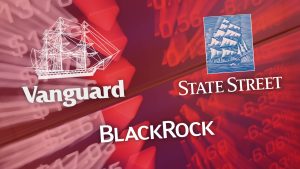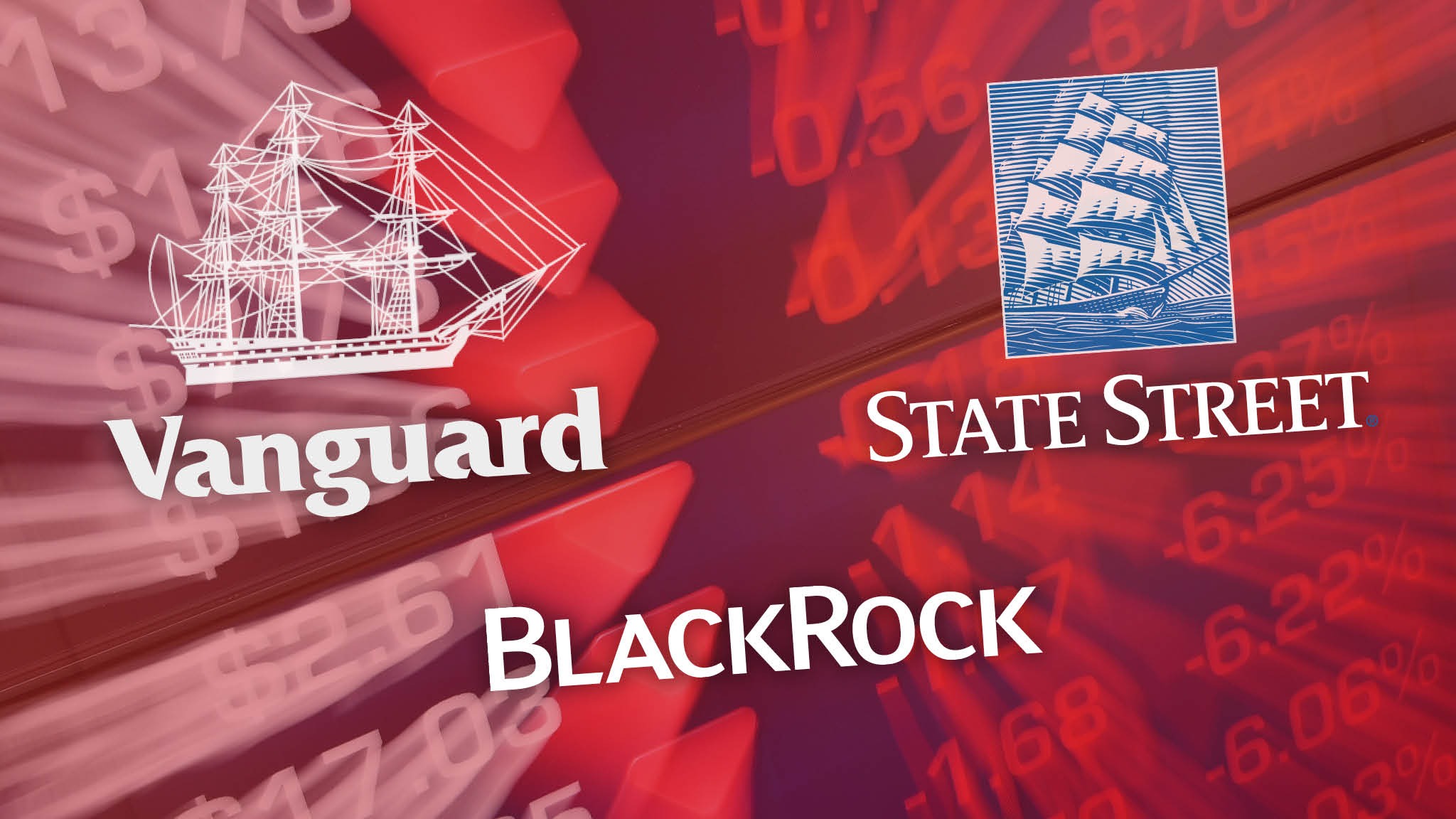“I’m not going to use the word ESG because it’s been misused by the far left and the far right.”
Larry Fink, the aptly named head of Blackrock, one of the handful of companies that owns – and rules – the world.
That was Blackrock CEO Larry Fink on June 25 at Aspen Ideas Festival attempting to put some distance between himself and the Environmental, Social and Governance (ESG) investment model that directs investor funds to companies not for profit per se, but to achieve equity: for the climate and social justice for minorities, for women, transgenders, gays and so forth. He also said he was “ashamed” to be a part of the discussion around ESG.

Trillions of dollars have flown through funds like Blackrock and Vanguard to restrict carbon energy production to bolster green alternatives, use racial and sexual hiring quotas to achieve race and gender equity and so forth, sparking backlash from consumers, investors and elected leaders who do not embrace what they perceive to be a radical social and political agenda.
In response to the backlash, now Fink apparently wants to rebrand the investment model, calling it “conscientious capitalism.” Not that it matters much. Over the years, ESG has also been labeled impact investing, economically targeted investing and stakeholder capitalism, where investments are not to solely benefit shareholders, but rather stakeholders who are impacted by corporations’ use of natural resources, labor and capital.
Instead of Environmental, Social and Governance, or ESG, Fink proposed: “we talk a lot about decarbonization, we talk a lot about governance … or social issues, if that’s something we need to address…”
Which is exactly the same thing. Literally the same thing. Fink is running away from a descriptive acronym.
ESG investments in the U.S. have grown to $8.4 trillion in 2022, according to the latest data by the USSIF, The Forum for Sustainable and Responsible Investment. A recent KPMG survey finding 82 percent of U.S. corporations are touting ESG sustainability goals in their corporate filings even though doing so by no means guarantees inclusion in hedge funds’ ESG funds like BlackRock, Vanguard, etc. It turns out, U.S. corporations are a cheap date.
To get there, ESG depends in part on government incentives to invest in tax deferred retirement plans, whether employer-based defined benefit and defined contribution plans, individual retirement accounts (IRAs) or government defined benefit retirement plans like the federal Thrift Savings Plan and state and city government employee pensions.
Over the years, Labor Department regulations across presidential administrations have also incentivized ESG investments, including those under the Employment Retirement Income Security Act (ERISA) by the Barack Obama Labor Department in 2015 allowing ESG investments into tax-deferred, employer-based retirement savings accounts like the $6.3 trillion 401(k) market and other defined benefit and defined contribution plans totaling $11.9 trillion.
There is also the $714 billion federal Thrift Savings Plan (TSP) that is making similar kinds of investments that began in 2022 after President Joe Biden gave it the green light, following other state government employee retirement funds in California, New York, Colorado, Connecticut, Maine, Maryland and Oregon.
Not to mention a Securities and Exchange Commission (SEC) to impose and enforce ESG on publicly traded corporations via a June 2022 proposed regulation on suppose “greenwashing”.
Separately, there is also the $11.7 trillion Individual Retirement Accounts (IRAs) market or the $10 trillion in state and local government retirement investments.
All told, there is a $32.3 trillion retirement savings market nationwide.
As for the defined benefit and contribution employer based plans, those touch about $11.9 trillion currently, but only make up 36.8 percent, of the $32 trillion total.
A 2020 regulation by the Trump Labor Department watered this regulation down a bit, mirroring a 2008 regulation by the George W. Bush Labor Department, but was promptly overturned via a May 2021 executive order by President Joe Biden defining climate change a financial risk under ERISA and affirmed later via a 2022 regulation by the Biden Labor Department. The 2008 regulation was actually a revision of a 1994 regulation by the Bill Clinton Labor Department, which in turn were revisions to the rules made by prior administrations.
The Labor Department rules based on the fiduciary duties and obligations defined under federal law in 29 U.S.C. Section 1104, which states, “a fiduciary shall discharge his duties with respect to a plan solely in the interest of the participants and beneficiaries and… for the exclusive purpose of … providing benefits to participants and their beneficiaries; and … defraying reasonable expenses of administering the plan; … with the care, skill, prudence, and diligence under the circumstances then prevailing that a prudent man acting in a like capacity and familiar with such matters would use in the conduct of an enterprise of a like character and with like aims; … by diversifying the investments of the plan so as to minimize the risk of large losses, unless under the circumstances it is clearly prudent not to do so; and … in accordance with the documents and instruments governing the plan insofar as such documents and instruments are consistent with the provisions of this subchapter and subchapter III.”
Even the 2020 regulation by the Trump Labor Department still allowed ESG under an “all things being equal” test, and stated, “The final rule recognizes that there are instances where one or more environmental, social, or governance factors will present an economic business risk or opportunity that corporate officers, directors, and qualified investment professionals would appropriately treat as material economic considerations under generally accepted investment theories.”
So, for as much pushback as there has been, so far, Republican efforts at curtailing ESG have not been terribly effective.
More recently, this has led Republican Attorneys General to file lawsuits alleging that decarbonization and moves to eliminate the oil and coal industries to drive up prices and incentivize green alternatives violate federal antitrust laws, with former Arizona Attorney General Mark Brnovich and former Nebraska Attorney General Doug Peterson and 17 other Republican Attorneys General that threatened the $10 trillion hedge fund BlackRock with antitrust legal action in an Aug. 4, 2022 letter to BlackRock CEO Larry Fink accusing the company of “intentionally restrain[ing] and harm[ing] the competitiveness of the energy markets” with its market dominance of retirement investments.
Additionally, America First Legal has recently alleged in an April 2023 civil rights complaint to the U.S. Equal Employment Opportunity Commission that the racial and gender hiring quotas by Anheuser-Busch violate Title VII of the Civil Rights Act that prohibit race and sex-based hiring preferences on its face.
State Republican governors are also restricting investments from their state employee pensions, although it is unclear how much red states were even explicitly investing in ESG in the first place.
And former President Donald Trump, who is once again running for president as a Republican in 2024, has promised in a video post on Truth Social to ban via executive order and changes to federal law Environmental, Social and Governance (ESG) retirement investments that have led to divestment from traditional U.S. energy production in violation of federal antitrust laws and racial and gender hiring quotas that appear to violate Title VII of the Civil Rights Act.
ESG investments in the U.S. have grown to $8.4 trillion in 2022, according to the latest data by the USSIF, The Forum for Sustainable and Responsible Investment.
“When I’m in the White House I will sign an executive order and with Congress’ support a law to keep politics away from America’s retirement accounts forever. I will demand that funds invest your money to help you, not them, but to help you, not to help radical left communists…” Trump said in the video, promising an executive order that will direct departments and agencies to end the perverse subsidies.
The push for woke has also recently led to consumer boycotts of brands like Bud Light and Target that have promoted transgender and Pride Month activist issues including LGBTQ children’s clothing lines. In 2021, nearly 300 companies including NBC, Paramount, Sony, Google, Twitter (prior to Elon Musk’s acquisition of the company), Facebook, Apple, Intuit, Microsoft, Adobe, Amazon, AT&T, T-Mobile, and almost all the big banks, etc. signed a joint Human Rights Campaign letter in 2021 stating in opposition to state legislation that would ban transgender surgeries for anyone under the age of 18: “We are deeply concerned by the bills being introduced in state houses across the country that single out LGBTQ individuals – many specifically targeting transgender youth – for exclusion or differential treatment. Laws that would affect access to medical care for transgender people, parental rights, social and family services, student sports, or access to public facilities such as restrooms, unnecessarily and uncharitably single out already marginalized groups for additional disadvantage.”
But the push is more than just environmental and social issues, it also includes censorship on social media. It impacts social media, too. For example, prior to the purchase of Twitter by Elon Musk, and flush with billions of dollars of capital from ESG investing, social media platforms like Twitter have pursued aggressive Diversity & Inclusion and other politically charged objectives, which internally impact racial and gender hiring quotas and diversity sensitivity training in companies, but outwardly on a social media platform, have meant explicit censorship policies under the guise of terms of service to police speech on the platforms that does not agree with those objectives.
In 2020, Twitter’s ESG report declared that would not “amplify” the speech of some on their platform: “Freedom of speech is a fundamental human right — but freedom to have that speech amplified by Twitter is not. Our rules exist to promote healthy conversations.” Also, “We aim to strike an appropriate balance between empowering freedom of expression and creating a safe service for participatory, public conversation.” Apparently, like Animal Farm, some have more freedom of expression than others.
The boycotts are effective at calling attention to some of these issues, and may impact some bottom lines, but it would take more than boycotts to eliminate the government retirement incentives via tax deferred retirement savings. At the end of the day, these investments are targeting industries that have been deemed harmful: oil and coal (uses too much carbon), beer and alcohol (uses too much water) or even paper products like comics or roleplaying games (uses too much paper). Targeted industries are being marked for either transformation or death. Either will do.
For those who are suffer under this overall regime of intentional energy price inflation, racial and sex-based corporate discrimination and blatant corporate censorship, it doesn’t much matter what Larry Fink and Blackrock call it, whether ESG, “conscientious capitalism,” impact investing or stakeholder capitalism, it remains a radical push to transform the U.S. and global economies into something, not based on profit, but on purpose. He can call it anything he wants, and the backlash will remain the same.
Robert Romano is the Vice President of Public Policy at Americans for Limited Government Foundation.
